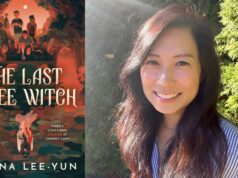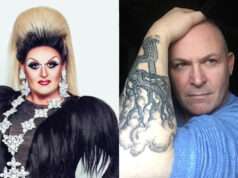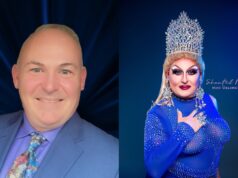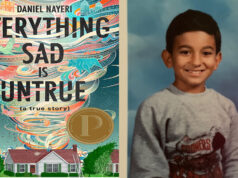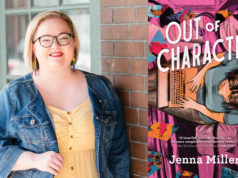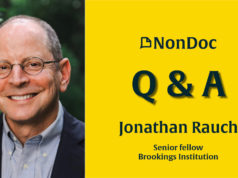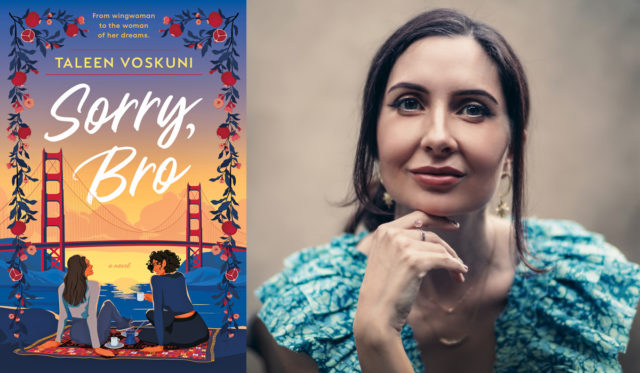
(Editor’s note: NonDoc’s Author Umbrella interviews up-and-coming writers, particularly authors of color, authors of disability and LGBTQ+ authors. The interviews have been transcribed and lightly edited for length and clarity.)
This installment of our Author Umbrella series features an interview with Armenian-American author Taleen Voskuni. Voskuni recently spoke to NonDoc about her debut romantic comedy, Sorry, Bro, which hits bookstores Tuesday.
A quick synopsis of the novel:
When Nareh Bedrossian’s non-Armenian boyfriend gets down on one knee and proposes to her in front of a room full of drunk San Francisco tech boys, she realizes it’s time to find someone who shares her idea of romance.
Enter her mother: armed with plenty of mom-guilt and a spreadsheet of Facebook-stalked Armenian men, she convinces Nareh to attend Explore Armenia, a month-long series of events in the city. But it’s not the mom-approved playboy doctor or the wealthy engineer who catch Nareh’s eye — it’s Erebuni, a woman as immersed in the witchy arts as she is in preserving Armenian identity. Suddenly, with Erebuni as her wingwoman, the events feel like far less of a chore, and much more of an adventure. Who knew cooking up kuftes together could be so … sexy?
Erebuni helps Nareh see the beauty of their shared culture and makes her feel understood in a way she never has before. But there’s one teeny problem: Nareh’s not exactly out as bisexual. The clock is ticking on her double life—the Explore Armenia closing banquet is coming up, and her entire extended family will be there, along with Erebuni. Her worlds will inevitably collide, but Nar is determined to be brave and to claim her happiness: proudly Armenian, proudly bisexual, and proudly herself for the first time in her life.
In Sorry, Bro, we follow 27-year-old Nareh on a husband hunt, where she rediscovers her Armenian roots through a sweet, blossoming relationship with wingwoman, Erebuni. The Armenian community has been wracked with a long history of tremendous suffering, from the Armenian genocide in 1915 by the Ottoman Turks to the inhumane treatment of Armenians by the Azerbaijani as recently as last year. So, the fact that you’ve centered Armenian happiness, particularly queer joy, seems like a beautiful act of defiance. What propelled you to lean into joy in writing an Armenian rom-com?
Firstly, thank you for acknowledging the difficulties Armenians have faced and continue to face today. I was writing this book while the 2020 war between Azerbaijan and Armenia broke out, and it felt essential to me to tell our story with the world. And not only Armenia’s tragedies (which I do discuss in the book) but the beauty and humor in our culture. I fear that if non-Armenians ever do hear about us, they hear a small and sad slice, and I hadn’t seen our joy written about in any commercial books. I wanted to show that, while we are marked by tragedy, we are so much more than that. I hope that by sharing the richness of our culture, I’m very much saying, “We are here, and we are not going anywhere.”
Also, I do simply love Armenian culture, and I find that there is a lot of humor in everyday interactions with family and the community that hadn’t been written down. Armenian comedians are doing wonderful work here, but there isn’t a book that dives into it, so I wanted to be the one to write it.
You mentioned in an incredible interview with Azad Archives that you had in mind several layers of audiences guiding you through the writing process: your sister, the broader Armenian diaspora and queer Armenians. When Sorry, Bro hits bookshelves on Jan 31, what do you hope is the biggest takeaway for these audiences?
I want Armenians to feel seen in this book the way they haven’t been in literature before. I hope they get that “wow” feeling rush over them, that they see their cousins, mothers, aunties, teachers, etc. in this book. I want them to feel that this part of them is understood, that even though we’re such unique individuals we also have so much in common and that it’s to be celebrated.
For queer Armenians, I hope this book gives them some hope. Our culture is pretty conservative, which I believe is a survival tactic: Stay within the lines so the culture remains preserved. Because of that, there are many stories of queer Armenians that don’t end happily, but I wanted to show that there is hope, that some stories can end happily. It’s not all sorrow with us. You can be queer and you can be Armenian and you can still have your family. You are still valid.
During the 7 Minutes in Book Heaven podcast with This Queer Book Saved My Life, I discovered that we share a mutual love of that spicy minivan scene in Livy Hart’s Talk Flirty To Me, which you called “a masterclass on intentional flirtation.” I agree, wholeheartedly. Sorry, Bro also has an incredible, flirty scene over Armenian coffee. What do you think is the key to weaving that perfect build-up in a scene where the sparks are flying?
Ahh, that book is so fantastic. Livy is brilliant at writing flirtation and humor.
I think for flirty scenes to work well, there has to be pages and pages of buildup. The desire starts off tiny then grows. That’s the first element. The second is that there needs to be a perceived one-sidedeness, where the character thinks, “Do they even like me?” So they aren’t sure, and that creates surprise when the love interest reciprocates. And third, though not always necessary (but I love it), is that there should be a reason why the two people can’t be together. So, as they are getting closer and closer and about to get what they want, there’s an opposing current that’s growing stronger, which is the reason they need to stay apart. That keeps the tension going!
I can see Sorry, Bro spurring candid conversations about Armenia’s overlooked history and culture, and how that continues to affect the Armenian diaspora. Both light-hearted and thoughtful, your book allows a broad audience to better understand the issues Armenians have faced and continue to face. Ideally, what questions would you like readers to take away from reading your work?
I would love readers to think about why they haven’t heard much about Armenian culture before and why it has been so overlooked. It would be great if readers read up a bit on Armenia’s history and Armenia’s current grim situation. And with all this, I hope that readers, when they see Armenia is in trouble, will care and will take action. I hope they will share, will donate and will contact their reps. That’d be my greatest wish.
I’m going to fan-girl here for a minute. You mentioned last year that your Author Mentor Match mentor was none other than writing superstar Jesse Q. Sutanto (Dial A for Aunties). How did she guide your revisions on Sorry, Bro? And were you initially starstruck?
Jesse is the best! She is a rockstar writer and also the kindest person. I was so lucky to be paired up with her in Author Mentor Match, the mentorship that brought you and me together, too.
I was so starstruck, Tiara. I couldn’t believe that this very important person was telling me all these complimentary things about my book and taking so much time out of her day to chat with me and help me out. And help me she did!
Jesse has created this deeply effective editing spreadsheet method that I now swear by. It’s simple in a way that is easy to do and makes editing feel doable, not like an insurmountable chore. Editing went from being my most dreaded part of writing to the easiest. A big thank you to Jesse for that.
Sorry, Bro’s gorgeous cover is truly art. My eyes could feast upon it all day, (and they will on release day!). What details stand out most for you, and what are the more symbolic elements woven into the cover?
Thank you so much! My cover artist, Liza Rusalskaya, and cover designer, Katie Anderson, knocked it out of the park. I am so grateful.
The pomegranate garland was one of the first elements I saw, and I couldn’t believe my eyes. Pomegranates are an important symbol for Armenians, of fertility and abundance. We have them all over our homes.
The two women are also sitting on an Armenian rug, drinking our coffee, called sourj. Sourj is such an important part of the culture, the tradition. And, as you know, I included sourj in the flirtiest scene in Sorry, Bro so I really wanted it on the cover. At first, they weren’t sure if they could get it in, but I threw my dignity to the wind and begged to have Armenian coffee on the cover. I think everyone is happier that the sourj elements are there!
Also, a fun hidden piece is that the cover colors mirror the Armenian flag’s: red, blue, orange.
Out of all the interviews you’ve done for Sorry, Bro, what’s the one question you haven’t been asked that you secretly wish a reporter would finally ask?
What a fun question! This is not necessarily a deep one, but I’d love to be asked if there were any scenes that had to be cut from Sorry, Bro that I particularly miss — I want to be asked this because I do have an answer for it!
Sorry, Bro’s first few drafts were quite long and included more subplots. One of them is that the protagonist, Nareh, goes out with the hottest Armenian bachelor, Raffi, who turns out to be a complete jerk. There’s a scene where he’s late to meet her at the bar she picked, and Nareh is waiting so long she orders herself a drink. All the drinks are expensive, and she’s not rolling in dough so it’s painful for her. Then he shows up, loudly insults the bar within the bartender’s earshot, and downs her drink in one gulp. I had a lot of fun writing that one. I’m a little sad it’s gone, but the book does overall work better without it. That’s part of writing though: Letting go to make the overall piece better.










